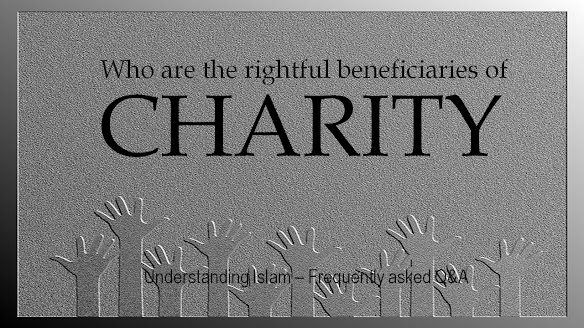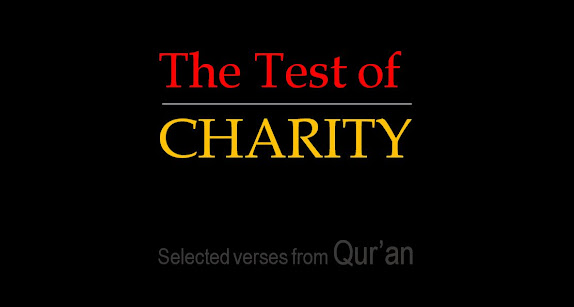Islam lays a huge emphasis on charity by reaching out to the people who deserve our attention, love and care and assistance, and not they reaching out to those who have the means to spare even a piece of date. The Muslim society revolves around caring and sharing what Allah has given to the believers with those who have been given less and are in need. A society where charity is profusely given fosters brotherhood and a bondage of true Muslim-hood.
But should it mean that even a big don who who has earned money from illegal means should also give charity and feel satisfied that by doing so he has cleansed his loot? The following 267th verse from Surah 2 Al Baqarah (The Cow) clarifies it all:
يٰۤـاَيُّهَا الَّذِيۡنَ اٰمَنُوۡۤا اَنۡفِقُوۡا مِنۡ طَيِّبٰتِ مَا كَسَبۡتُمۡ وَمِمَّاۤ اَخۡرَجۡنَا لَـكُمۡ مِّنَ الۡاَرۡضِ وَلَا تَيَمَّمُوا الۡخَبِيۡثَ مِنۡهُ تُنۡفِقُوۡنَ وَلَسۡتُمۡ بِاٰخِذِيۡهِ اِلَّاۤ اَنۡ تُغۡمِضُوۡا فِيۡهِؕ وَاعۡلَمُوۡۤا اَنَّ اللّٰهَ غَنِىٌّ حَمِيۡدٌ
(2:267) Believers! Spend (in the Way of Allah) out of the good things you have earned and out of what We have produced for you from the earth, and choose not for your spending the bad things such as you yourselves would not accept or accept only by overlooking its defects. Know well that Allah is All-Munificent, Most Praiseworthy.
Many Muslim exegete have explained the true spirit behind giving out charity and its means. Renounced exegetes Ibn Kathir and Muhammad Asad explain:
Ibn Kathir Explanation:
Allah commands His believing servants to spend in charity, as Ibn `Abbas stated, from the pure, honest money that they earned and from the fruits and vegetables that He has grown for them in the land. Ibn `Abbas said, "Allah commanded them to spend from the purest, finest and best types of their money and prohibited spending from evil and dishonest money, because Allah is pure and good and only accepts that which is pure and good.''
This is why Allah said, " وَلاَ تَيَمَّمُواْ الْخَبِيثَ " (and do not aim at that which is bad) meaning, filthy (impure) money, " مِنْهُ تُنفِقُونَ وَلَسْتُم بِأَخِذِيهِ " (to spend from it, (though) you would not accept it) meaning, "If you were given this type, you would not take it, except if you tolerate the deficiency in it. Verily, Allah is far Richer than you, He is in no need of this money, so do not give, for His sake, what you would dislike for yourselves.'' It was reported that, (and do not aim at that which is bad to spend from it) means, "Do not spend from the dishonest, impure money instead of the honest, pure money.''
Ibn Jarir recorded that Al-Bara' bin `Azib commented on Allah's statement,
" يأَيُّهَا الَّذِينَ ءَامَنُواْ أَنفِقُواْ مِن طَيِّبَـتِ مَا كَسَبْتُمْ وَمِمَّآ أَخْرَجْنَا لَكُم مِّنَ الاٌّرْضِ وَلاَ تَيَمَّمُواْ الْخَبِيثَ مِنْهُ تُنفِقُونَ " (O you who believe! Spend of the good things which you have (legally) earned, and of that which We have produced from the earth for you, and do not aim at that which is bad to spend from it,) that it was revealed about the Ansar. When the season for harvesting date-trees would start, the Ansar would collect ripe-date branches from their gardens and hang them on a rope erected between two pillars in the Masjid of the Messenger of Allah. The poor emigrant Companions would eat from these dates. However, some of them (Ansar) would also add lesser type of dates in between ripe-date branches, thinking they are allowed to do so. Allah revealed this Ayah about those who did this,
`Ali bin Abi Talhah said that Ibn `Abbas commented on the Ayah, " وَلَسْتُم بِأَخِذِيهِ إِلاَ أَن تُغْمِضُواْ فِيهِ " (you would not accept it save if you close your eyes and tolerate therein) means, "If you had a right on someone who would pay you less than what you gave them, you would not agree until you require more from them to make up the difference.
This is why Allah said, " إِلاَ أَن تُغْمِضُواْ فِيهِ " (save if you close your eyes and tolerate therein) meaning, `How do you agree for Me what you do not agree for yourselves, while I have a right to the best and most precious of your possessions'' Ibn Abi Hatim and Ibn Jarir recorded this Hadith and Ibn Jarir added, "
And this is the meaning of Allah's statement, " لَن تَنَالُواْ الْبِرَّ حَتَّى تُنفِقُواْ مِمَّا تُحِبُّونَ " (By no means shall you attain Al-Birr, unless you spend of that which you love)'' [4:92]
Allah said next, " وَاعْلَمُواْ أَنَّ اللَّهَ غَنِيٌّ حَمِيدٌ " (And know that Allah is Rich (free of all needs), and worthy of all praise) meaning, "Although Allah commanded you to give away the purest of your money in charity, He is far Richer from needing your charity, but the purpose is that the distance between the rich and the poor becomes less.''
Similarly, Allah said, " لَن يَنَالَ اللَّهَ لُحُومُهَا وَلاَ دِمَآؤُهَا وَلَـكِن يَنَالُهُ التَّقْوَى مِنكُمْ " (It is neither their meat nor their blood that reaches Allah, but it is piety from you that reaches Him) [22:37].
Allah is Rich and free of needing anything from any of His creatures, while all of His creatures stand in need of Him. Allah's bounty encompassing, and what He has never ends. Therefore, whoever gives away good and pure things in charity, let him know that Allah is the Most Rich, His favor is enormous and He is Most Generous, Most Compassionate; and He shall reward him for his charity and multiply it many times. So who would lend to He Who is neither poor nor unjust, Who is worthy of all praise in all His actions, statements, and decisions, of Whom there is neither a deity worthy of worship except Him, nor a Lord other than Him
Muhammad Asad Explanation:
According to the English proverb "Charity covers a multitude of sins". Such a sentiment is strongly disapproved in Islam. Charity has value only if (1) something good and valuable is given, (2) which has been honorably earned or acquired by the giver, or (3) which is produced in nature and can be referred to as a bounty of God. (1) May include such things as are of use and value to others though they may be of less use to us or superfluous to us on account of our having acquired something more suitable for our station in life; for example, discarded clothes, or an old horse or a used motor car; but if the horse is vicious, or the car engine so far gone that it is dangerous to use, then the gift is worse than useless; it is positively harmful and the giver is a wrong-doer. (2) Applies to fraudulent company-promoters, who earn great credit by giving away charity in some of their ill-gotten gains, or to robbers (even if they call themselves by high-sounding names) who "rob peter to pay Paul". Islam will have nothing to do with tainted property. Its economic code requires that every gain should be honest and honorable. Even "charity" would not cover or destroy the taint. (3) Lays down a test in cases of a doubtful gain. Can we refer to it as a gift of God? Obviously the produce of honest labour or agriculture can be so referred to. In modern commerce and speculation there is much of quite the contrary character, and charity will not cover the taint. Some kind of art, skill, or talent are God-given: it is the highest kind of charity to teach them or share their product. Others are the contrary: they are bad or tainted. In the same way some professions or services may be tainted, if these tend to do moral harm.
The preceding note tries to indicate some of the things which are bad or tainted. We should not even think of acquiring them for ourselves, soothing our conscience by the salve that we shall practice charity out of them. To dedicate tainted things to God is a dishonor to God, Who is independent of all wants, and Who is worthy of all honor and praise.
While giving remember: To ease another’s heartache is to forget one’s own. So give out as much as you can from your rightful earnings so that one who is receiving is satisfied that he is receiving a charity from a rightful earning.


























